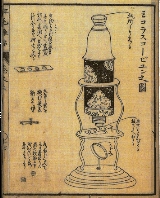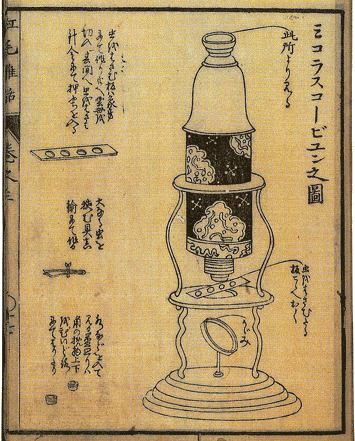
Morishima Churyo
Encyclopedia

Edo period
The , or , is a division of Japanese history which was ruled by the shoguns of the Tokugawa family, running from 1603 to 1868. The political entity of this period was the Tokugawa shogunate....
Japanese author
Author
An author is broadly defined as "the person who originates or gives existence to anything" and that authorship determines responsibility for what is created. Narrowly defined, an author is the originator of any written work.-Legal significance:...
of popular fiction who also wrote a number of works in the field of rangaku
Rangaku
Rangaku is a body of knowledge developed by Japan through its contacts with the Dutch enclave of Dejima, which allowed Japan to keep abreast of Western technology and medicine in the period when the country was closed to foreigners, 1641–1853, because of the Tokugawa shogunate’s policy of national...
(Western studies). He wrote under many pen name
Pen name
A pen name, nom de plume, or literary double, is a pseudonym adopted by an author. A pen name may be used to make the author's name more distinctive, to disguise his or her gender, to distance an author from some or all of his or her works, to protect the author from retribution for his or her...
s, including Manzōtei, Shinra Manzō (or, conventionally, Shinra Banshō), and Tenjiku
Tenjiku
is the obsolete Japanese word for ancient India. It is used in such works as the Japanese translation of Journey to the West....
Rōjin ("old man from India"). The latter constituted an allusion to the pen name Tenjiku Rōnin ("masterless samurai from India"), used by Hiraga Gennai
Hiraga Gennai
was an Edo period Japanese pharmacologist, student of Rangaku, physician, author, painter and inventor who is well known for his Erekiteru , Kandankei and Kakanpu...
, to whom Chūryō was the principal literary successor. Chūryō co-authored several plays with Gennai early in his career, and went on to write in almost all of the many genres of popular fiction that were collectively known as gesaku
Gesaku
is an alternative style, genre or school of Japanese literature. In the simplest contemporary sense, any literary work of a playful, mocking, joking, silly or frivolous nature may be called Gesaku. Unlike predecessors in the literary field, Gesaku writers did not strive for beauty and perfect...
. He also wrote kyōka, or comic poetry, under the pen name Taketsue no Sugaru. Chūryō was the younger brother of Katsuragawa Hoshū
Katsuragawa Hoshu
was a Japanese physician and scholar of rangaku . He served the Tokugawa shogunate as a physician and as a translator of Dutch. He was the older brother of author and rangaku scholar Morishima Chūryō....
, a shogunal physician and leading scholar of rangaku.

